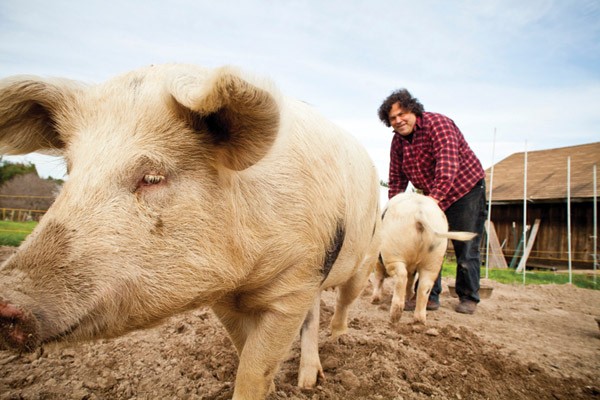[image-1]
The farm-to-table movement has given way to the chef-as-farmer. It’s not enough to serve local and seasonal produce these days—for an increasing number of chefs, growing it is just as important as cooking it.
The kitchen garden, or potager, is a well-established tradition in Europe, but it’s a relatively new phenomenon in the United States. Chefs Dan Barber of New York City’s Blue Hill Restaurant and David Kinch of Manresa in Los Gatos are probably the most well known chefs with farms. St. Helena’s Restaurant at Meadowwood and Yountville’s French Laundry both source produce from their own gardens now as well. It sounds so idyllic: a chef trots down to the farm with a basket in hand to pluck and snip dewy produce for the night’s menu. But the reality can be much different. Just ask chef Tony Najiola.
Najiola is chef and owner of Central Market, an eclectic, Mediterranean-meets-the-world restaurant in downtown Petaluma. The shaggy-haired, 50-year-old chef always wanted a small farm of his own; his great grandfather was a Sicilian immigrant who had a farm in New Orleans where he grew up, and visiting the farm had a lasting effect on him. Also, as a chef, the prospect of his own source of produce was enticing.
And another thing. He really wanted to raise pigs.
Najiola’s career has taken him from New Orleans and New York City to San Francisco and, now, Sonoma County. After working as a chef at Ravenswood Winery, he set out on his own with the backing of Ravenswood founder Joel Peterson and opened Central Market.
That was eight years ago, and finally, last year, Najiola fulfilled his dream. He bought a three-acre farm just two miles from the restaurant, something that makes the Petaluma area special, he says. He named it Muleheart Farms, because “you had better have the heart of mule to own a restaurant and a farm.” He lives on the property, a beautiful patch of land with a weathered redwood barn, a flock of chickens, vegetable rows and his beloved pigs, Gloucestershire Old Spots, mixed with a little Duroc.
“I knew I always wanted to raise pigs, but I didn’t know how much I’d enjoy it,” he says. “I’ve just fallen in love with them.”
Plans are in the works to add stone fruit trees, build cooking facilities in the barn and to host outdoor dining events. But the farm doesn’t supply all the restaurant’s needs—far from it. Najiola says it’s impossible to compete with big agriculture in price and availability. Right now, wild nettle, various winter greens and squash are featured on his menu. (The hand-cut linguini with clams, green beans and nettle pesto is a winner.) But even with help via early-rising interns from Green String Farm across town, the economy of scale just isn’t there. He still has to purchase additional produce from wholesalers.
“I knew it was going to be a losing proposition when we started,” he says. “We’re competing with big ag, and you’re done even before you get started.”
What’s more, he notes, running a restaurant is very different than running a farm. They work on different cycles. When a chef needs 100 pounds of potatoes, he needs it now. A small farm doesn’t work that way, and Najiola says the experience has been deeply humbling, but rewarding, too.
The best part is the pigs, he says, kneeling down and scratching a lounging sow behind the ear. His affection for the swine doesn’t inhibit him from eating them; the first time he sent his pigs off to slaughter, he felt like “a kid on Christmas morning.”
Raising pigs, it turns out, provides the greatest economic return for any part of the farm. Buying a whole animal on the wholesale market would be cost-prohibitive, and anyway, he says, his pigs taste better.
Because he raises less than a dozen pigs at a time, they’re not always available in the restaurant. When they are, diners come running. Regular customers sign up to receive email notification when the pork comes in, and when people hear the meat was raised on his farm a stone’s throw away, they can’t resist.
“They love it,” Najiola says. “Any time you say it’s from the farm, it sells. Immediately.” He believes the pork has a different quality than anything available on the market, adding his firm belief that “you feel better after you eat meat like that.”
Najiola uses every part of the animal, and also intercepts food and paper waste generated by his restaurant and turns it into compost, something that he feels good about. “Restaurants are incredibly wasteful,” he says. “If nothing else, the farm gives us a place to put that waste.”
But in spite of the challenges, Najiola sees his farm as more than a green-waste recycler.
“It’s kind of circle for me,” he says, citing the example of his great grandfather. “As a chef, this is what I always wanted.”










Looking for 3 to 4 wiener pigs to raise to butcher please call 707-338-0485